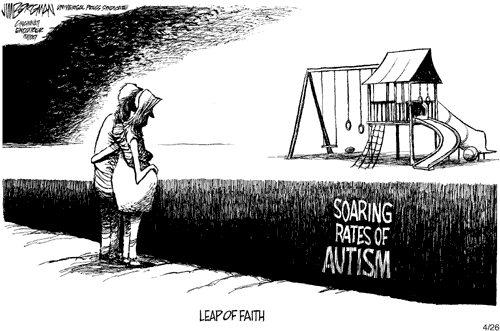Yesterday the Supreme Court handed down its decision in Massachusetts v. EPA, involving a set of opinions that I, for one, found very entertaining. The Court split 5-4 along liberal/conservative lines with Kennedy joining the liberals.
At issue was an attempt my Massachusetts (and a bunch of other states, some cities, and some private entities) to force the EPA to regulate carbon dioxide emissions from automobiles. The EPA had refused to do so based, in part, on its own interpretation of the Clean Air Act. According to the EPA's construction of the statute, the EPA lacked the power to regulate automotive carbon dioxide emissions. In other words, the EPA willingly tied its own hands to avoid having to decide whether to regulate automotive emissions.
The Court issued two key rulings. First, the Court held that Massachusetts had standing to bring this suit. Standing is a somewhat wacky constitutional doctrine that requires a plaintiff to have suffered an injury, caused by the defendant, that will be redressed by the relief sought, before a plaintiff can bring suit in federal court. I say "somewhat wacky" because the doctrine is profoundly unprincipled and very hard to pin down, the only discernible trend in recent years being a tendency on the part of the Court to restrict, rather than expand, the types of injury and causation that satisfy the standing requirement. The Court arguably expanded standing in this case by loosening the requirements when a state is a plaintiff (more on that below).
The second holding was that, contrary to the EPA's interpretation, the agency does have jurisdiction over automotive carbon dioxide emissions under the CAA. The Court did not hold that the EPA is required to regulate these emissions, but simply held that if the EPA decides not to they need a better reason than their erroneous interpretation of the statute. Commentators are saying that the consequences of this holding will be mainly political. Specifically, the EPA and the Bush Administration now have to face the political consequences of action (or inaction) regarding automotive emissions rather than claiming that the EPA has no power to engage the issue in the first place.
Stevens wrote the majority opinion, and Roberts and Scalia tag-teamed on the dissent side. Roberts took standing and Scalia took the merits.
That's the main gist of things. Now let's take a look at some of the law-geeky truffles buried in those tangled roots.
Know Your Current Events
The Court's conclusion as to standing was based in large part on its acknowledgment that anthropogenic global warming is an actual thing that actually exists. The majority opinion discusses the scientific evidence and opinions at length and in great detail. In fact, the "injury" that gave rise to Massachusetts' standing was the loss of coastal land due to global warming. Roberts admits "[g]lobal warming may be a 'crisis,' even 'the most pressing environmental problem of our time,'" but says the issue is adequately addressed by the political branches rather than the courts. Scalia says that "[t]he Court's alarm over global warming may or may not be justified, but it ought not distort the outcome of this litigation." Are the justices guided by their political views? Surely you jest!
Courting Kennedy
As this was a 5-4 decision, the two blocks on the Court were likely fighting fiercely over Kennedy's vote. Stevens' discussion of general standing princples is drawn almost entirely from a previous Kennedy concurrence, and he mentions Kennedy by name at one point. A Kennedy concurrence also appears embedded in one of Roberts' citations. Scalia, as usual, doesn't play this game, hoping to attract more flies with horsecrap than with honey.
Old-Timey Talk About States as Sovereign Nations
When discussing the "special solicitude" that states are entitled to in determining whether they have standing, Stevens reminisced about his childhood days in the eighteenth century, when the country was still cobbling itself together from a group of disjointed nation-states:
"When a State enters the Union, it surrenders certain sovereign prerogatives. Massachusetts cannot invade Rhode Island to force reductions in greenhouse gas emissions, it cannot negotiate an emissions treaty with China or India, and in some circumstances the exercise of its police powers to reduce in-state motor-vehicle emissions might well be pre-empted."
As I've hinted at before, a state as a civil plaintiff in front of the Supreme Court is a recipe for maximum excitement. Unfortunately this case didn't involve any decrees from the English monarchy, but I'll take what I can get.
Hot Buttered Statutory Interpretation
Scalia is very good a statutory interpretation, or at least at presenting his interpretation in a convincing manner. He really gets into it in his dissent, including a lengthy discussion of use of the word "including." He also makes the classic Scalia move of citing the Second Edition of Webster's New International Dictionary, which he prefers for some reason. Though his analysis really takes a dive when he starts trying to distinguish between "air" and "atmosphere."
Kneeling at the Altar of Hart & Wechsler
Stevens and Roberts each cite Hart & Wechsler's The Federal Courts and the Federal System, the authoritative and enormous textbook that serves as the Bible of all Fed Courts nerdery. Stevens has this to say:
"THE CHIEF JUSTICE accuses the Court of misreading Georgia v. Tennessee Copper Co., 206 U. S. 230 (1907), see post, at 3–4 (dissenting opinion), and "devis[ing] a new doctrine of state standing," id., at 15. But no less an authority than Hart & Wechsler's The Federal Courts and the Federal System understands Tennessee Copper as a standing decision."
Roberts shoots back:
"The Court seems to think we do not recognize that Tennessee Copper is a case about parens patriae standing, ante, at 17, n. 17, but we have no doubt about that. The point is that nothing in our cases (or Hart & Wechsler) suggests that the prudential requirements for parens patriae standing [citation] can somehow substitute for, or alter the content of, the 'irreducible constitutional minimum' requirements of injury in fact, causation, and redressability under Article III."
Disconnect Between the Court and Real People
People accuse Supreme Court Justices of being out of touch with the common man, and they're absolutely right. In poo-pooing the seriousness of Massachusetts' purported injury, Roberts says: "Schoolchildren know that a kingdom might be lost 'all for the want of a horseshoe nail,' but 'likely' redressability is a different matter." Neither Dr. M nor I (nor, as it turns out, my co-clerk) have any familiarity with this quote. Some quick googling revealed it to come from this totally freaking obscure nursery rhyme:
For want of a nail the shoe was lost.
For want of a shoe the horse was lost.
For want of a horse the rider was lost.
For want of a rider the battle was lost.
For want of a battle the kingdom was lost.
And all for the want of a horseshoe nail.
I'd venture to say that most schoolchildren do not, in fact, know this, unless they, like Chief Justice John G. Roberts, Jr., attended the Little Lord Fauntleroy School for the Weak.
Scalia also uses the phrase "grasp the nettles" at one point, though we can't be too hard on him given his farts and Frisbees remark.
The Possessive S Controversy
As an update on the controversy discussed here, Stevens uses "Massachusetts'," Roberts uses "Massachusetts's," and Scalia doesn't have occasion to use either.



